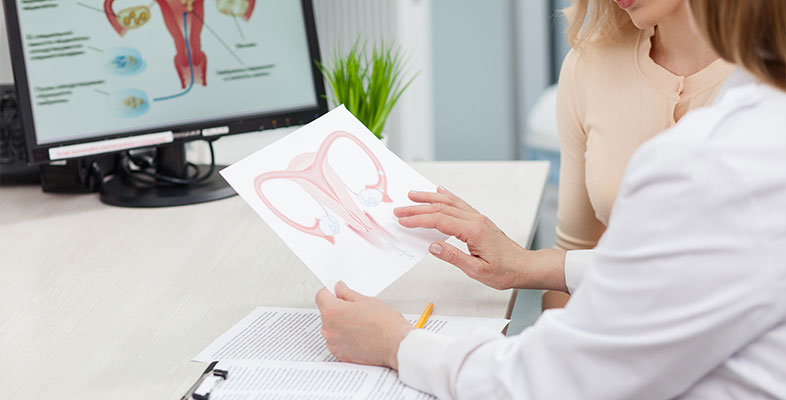

If you’re in your 30s and hoping to conceive, you may be discouraged to hear that your fertility is declining. National Center for Chronic Disease Prevention and Health Promotion shares vital statistics in connection with women’s fertility and age:
– About 1 in 5 (22%) couples in which the woman is 30-39 have problems conceiving their first child, compared to about 1 in 8 (13%) couples in which the woman is younger than 30.
The difference is significant! Fertility experts explain why it is so:
– Fertility declines with age primarily because egg quality declines over time. In addition, older women have fewer eggs left, and they are more likely to have health conditions that can cause fertility problems.
But don’t despair – you can do plenty of things to boost your fertility and increase your chances of getting pregnant. This article will cover the most important ways to boost your fertility, but if you would like to know more, visit our Fertility course category – and choose a course that will answer all your questions.

There are many things a woman can do to increase her fertility after 30. Some of the most important ways to boost fertility include:
Let’s take a closer look at each of these tips in more detail.
Eating a healthy diet is essential for overall health and fertility. Women trying to conceive should eat plenty of fruits, vegetables, whole grains, and lean proteins. They should also limit their intake of processed foods, saturated fats, and simple sugars.
A healthy diet provides the nutrients needed for a woman’s body to function optimally. It also helps to regulate hormones and maintain a healthy weight.
There are a few nutrients that are particularly important for fertility:
Folic acid: This is a water-soluble vitamin found in leafy green vegetables, legumes, nuts, and fortified foods. Folic acid is vital for the development of the neural tube. It can help to prevent birth defects of the brain and spine.
Iron: This is a mineral that is found in red meat, poultry, fish, legumes, and leafy green vegetables. Iron is important for the production of hemoglobin, which carries oxygen in the blood. An iron deficiency can lead to anemia, which can cause fertility problems.
Omega-3 fatty acids: These are found in fatty fish, such as salmon, mackerel, and herring, and flaxseeds, chia seeds, and walnuts. Omega-3 fatty acids are essential for hormone production and regulation. They can also help to reduce inflammation.
Zinc: This is a mineral that is found in meat, poultry, seafood, legumes, whole grains, and nuts. Zinc is vital for cell growth and division. It can also help to boost the immune system.
Maintaining a healthy weight is important for fertility. Being overweight or underweight can cause hormonal imbalance and influence ovulation.
A woman’s body mass index (BMI) is a good way to determine if she is at a healthy weight. A BMI of 18.5-24.9 is considered normal, 25-29.9 is considered overweight, and 30 or above is considered obese.
Women trying to conceive should aim for a BMI of 20-24.9. The Fertility & Gynaecology Academy explains:
—Overweight women have more of the leptin hormone, made in fatty tissue; too much leptin can interfere with hormonal balance, lowering fertility. Excess fat is also associated with lower levels of sex hormone-binding globulin (SHBG) which helps to govern the sex hormone estrogen.
Being underweight can also cause fertility problems. This is because being underweight can lead to a lower body fat percentage, which can disrupt hormone production and ovulation.
If you are trying to conceive, aim for a healthy weight. If you are overweight or underweight, talk to your doctor about ways to reach a healthy weight.
Getting regular exercise has a great impact on fertility. Exercise can help to regulate hormones, reduce stress, and maintain a healthy weight.
There is no need to start training for a marathon. Just 30 minutes of moderate exercise most days of the week is enough. Some great activities for fertility include walking, swimming, and yoga. You may also want to consider some strength training to help build muscle and bone mass.
If you are not used to exercising, start slowly and build up gradually. Listen to your body and stop if you feel pain or discomfort. Overexercising can actually lead to fertility problems, so it is crucial to find a balance.
When you are stressed, your body releases the hormone called cortisol. This hormone can interfere with ovulation and implantation.
It can be difficult to avoid stress entirely, but there are some things you can do to manage it:
There are many more ways of fighting stress. Find what works for you and stick with it. Even small changes can make a big difference.
Smoking is one of the worst things you can do for your fertility. Smoking can damage your eggs and lower your chances of conceiving. If you smoke and are trying to conceive, quitting is the best thing you can do for your fertility.
Talk to your doctor about ways to quit smoking. Many resources are available to help you stop, including nicotine replacement therapy, support groups, and counseling.
Those who love their morning cup of coffee may be disappointed to hear that it could harm their fertility.
While you don’t need to give up coffee entirely, it is best to limit yourself – according to The American College of Obstetricians and Gynecologists, the caffeine intake should be 200 mg or less per day. That’s about one 12-ounce cup of coffee.
Caffeine can interfere with ovulation and also increase the risk of miscarriage. If you are trying to conceive, it is best to limit your caffeine intake.
Other caffeinated beverages include tea, soda, and energy drinks. Be sure to check the labels for caffeine content.
The effect of alcohol on women’s fertility is not well understood yet, and studies are still being conducted. Some studies have found that alcohol has some impact on the possibility of getting pregnant; however, it is too early to come up with definite conclusions.
We know that alcohol damages the liver, which is responsible for removing toxins from our bodies. The liver also controls hormone production, so drinking alcohol can disrupt hormone production, and that way leads to fertility problems.
If you are trying to conceive, it is best to limit your alcohol intake or avoid it altogether.
Getting enough sleep is important for overall health, and it can also impact fertility.
Lack of sleep can lead to stress, disrupting hormone production and interfering with ovulation. It can also cause weight gain, which can lead to fertility problems.
Aim for 7-8 hours of sleep each night. If you have trouble sleeping, try some relaxation techniques such as yoga or meditation. You can also talk to your doctor about sleep aids.
Staying up late watching television or working on the computer can also disrupt your sleep. If you have trouble sleeping, avoid using electronics in the evening and create a relaxing bedtime routine.
What can come as a surprise, specialists at Mayo Clinic warn about working at night and sleeping during the day:
—Regularly working the night shift might put you at higher risk of infertility, possibly by affecting hormone production.
If you work the night shift, consider talking to your employer about changing your hours.

Apart from the above-mentioned general health and lifestyle tips, there are some specific things you can do to increase your chances of getting pregnant (regardless of your age):
If you are trying to conceive, it is essential to track your menstrual cycle. This will help you determine when you ovulate and increase your chances of having a baby.
There are many ways to track your menstrual cycle. You can use a calendar, an app, or ovulation predictor kits. Ovulation predictor kits measure the level of luteinizing hormone (LH) in your urine. LH is released before ovulation, so the kit can help you predict when you are about to ovulate.
You can also track your basal body temperature (BBT). Your BBT rises slightly when you ovulate. You can use a special BBT thermometer to track your temperature or an app such as OvuView.
Another way to track your ovulation is to look for changes in your cervical mucus. Your cervical mucus changes throughout your menstrual cycle, becoming thinner and more slippery when ovulating.
If you are tracking your menstrual cycle, keeping a record of your symptoms and when you ovulate is important. This will help you, and your doctor determine if there are any problems with your fertility.
If you are trying to conceive, it is a good idea to schedule a preconception visit with your doctor. This is a check-up to ensure you are healthy and that there are no medical problems that could interfere with conception. Your doctor will likely do a physical exam and order some tests, such as blood work.
Your doctor can also help you manage any medical conditions that might impact fertility, such as diabetes or high blood pressure.
A preconception visit is a good time to ask your doctor any questions you have about conception and pregnancy. Your doctor can also provide information about increasing your chances of conceiving.
If you don’t have a regular doctor, you can schedule a preconception visit with an OB-GYN or primary care provider.
If you are trying to conceive, it is essential to have sex regularly. This will increase your chances of conceiving because there will be more sperm available when you ovulate. You don’t need to have sex every day, but you should try to have sex every 2-3 days.

There are many factors that can impact fertility. Some factors, such as age or family history, are beyond your control. However, there are many things you can do to improve your fertility.
Making healthy lifestyle choices is one of the best things you can do for your fertility. Eating a nutritious diet, exercising regularly, and reducing stress can improve your chances of conceiving.
If you are trying to conceive, talk to your doctor about ways you can improve your fertility. There are many things you can do to increase your chances of conceiving. With the right lifestyle choices, you may be able to achieve your dream of becoming a parent.